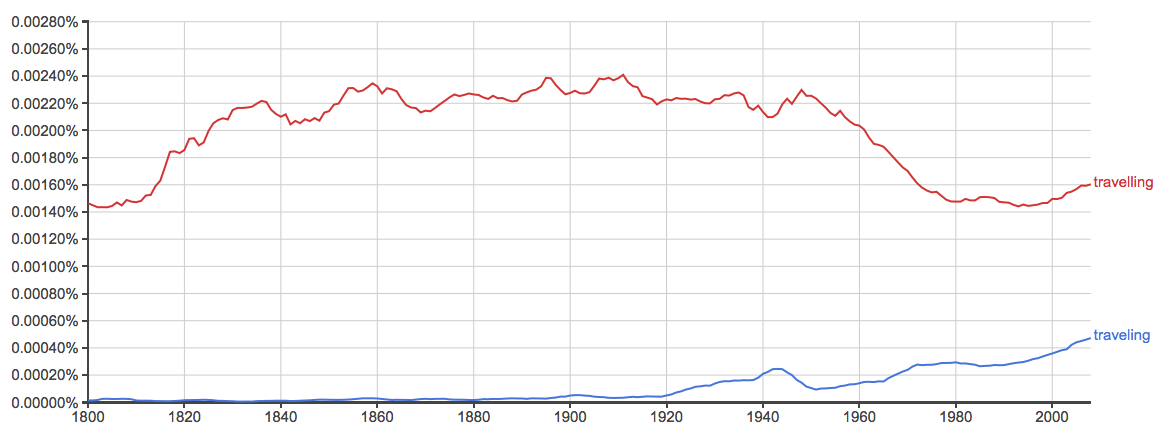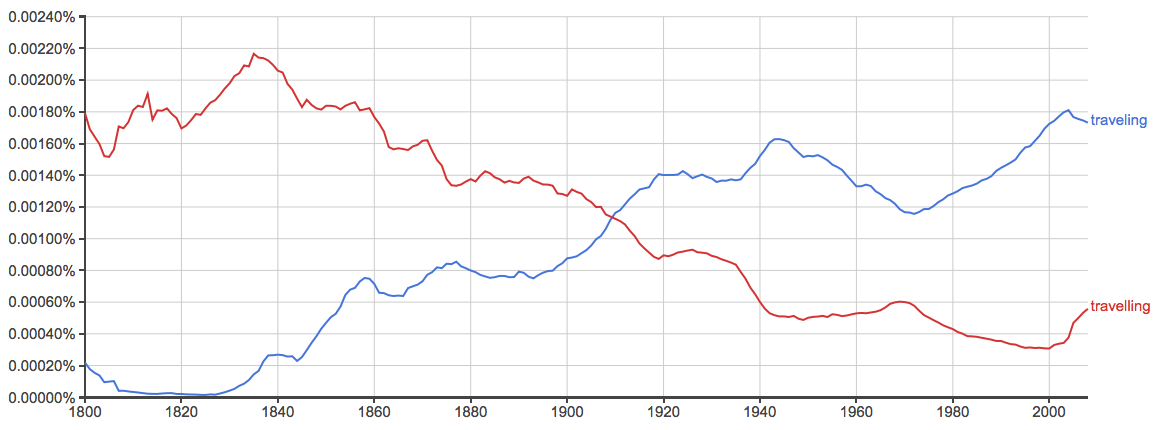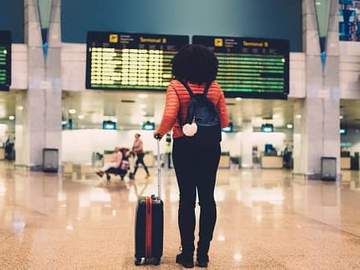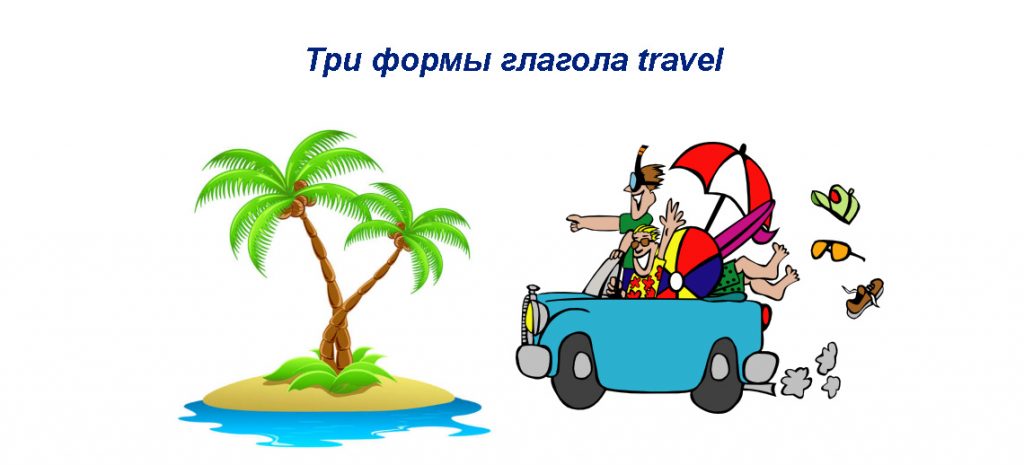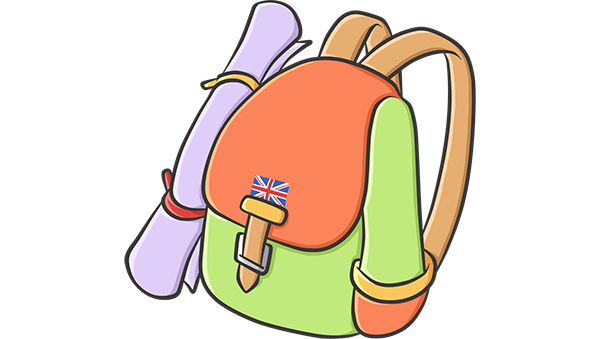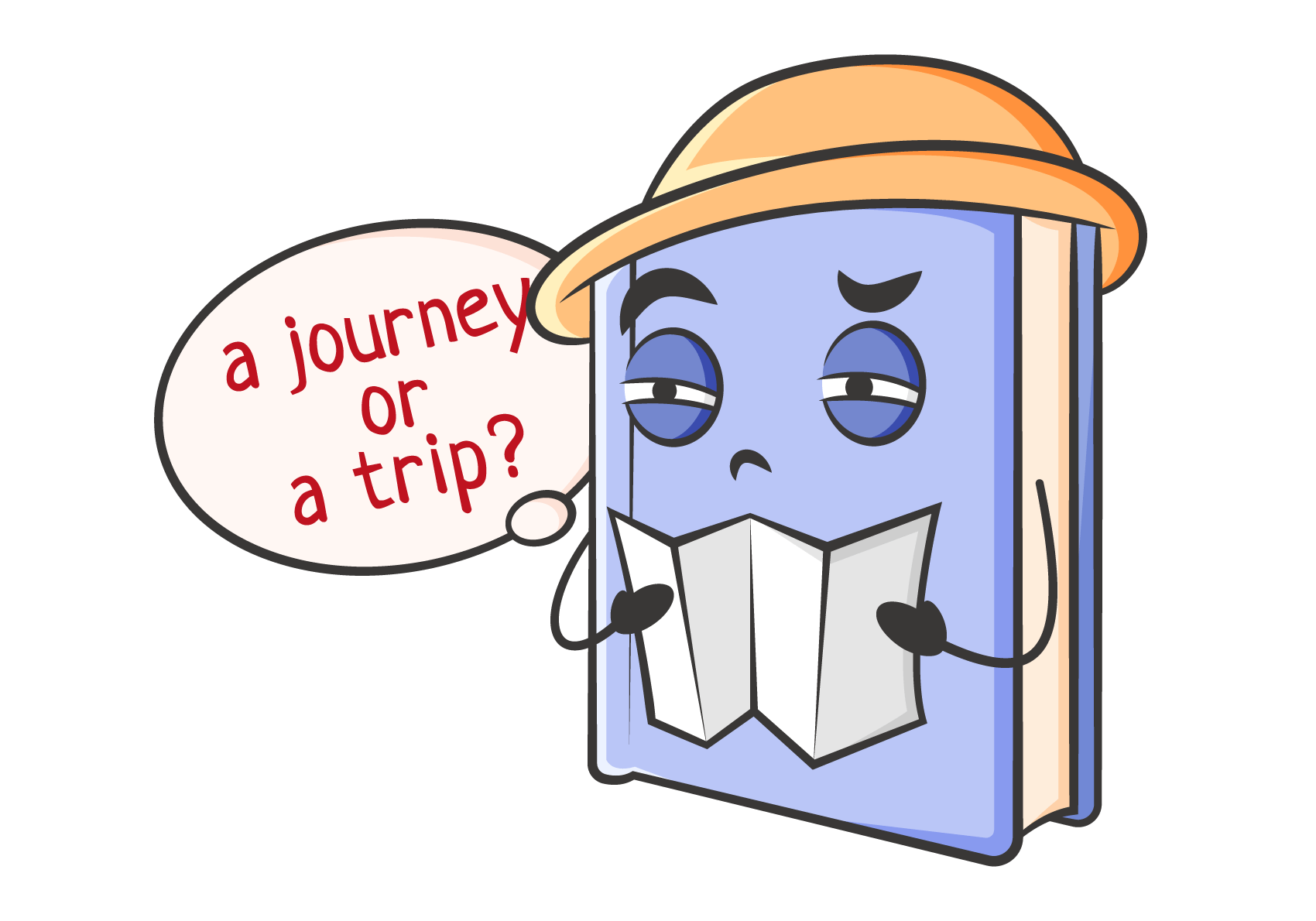Are you taking a trip anytime soon? If so, where will you be traveling? Or is it travelling? How exactly do you spell this word?
The two words traveling and travelling can cause some confusion for those writers not exactly sure when to use which one. Are they just variations of the same word? Do they have different meanings? Do they function differently in a sentence?
In today’s post, I want to address all of these questions so you will never again wonder or second-guess yourself, “Is it travelling or traveling?”
Travelling and traveling are both verbs, obviously. To travel is to go from one place to another, as on a trip or journey. For example,
It was already too late; he knew they wouldn’t be travelling far. –The New Yorker
- When the traveling pub is taken off a trailer and put together in a lot near Milwaukee and California avenues, it will boast 400 feet of bar space. –Chicago Sun Times
- They travelled 5,000 miles from Myanmar to place a plaque in Seagrim’s native village of Whissonsett in eastern England. –Washington Post
- Under that analysis, completion of the mobility plan would result in about 35 million miles per day being traveled on L.A. surface streets in 2035. –L.A. Times
You’re probably still thinking, “Okay, I still don’t know how to use these words.”
The difference between traveling vs. travelling isn’t much of a difference at all, really.
In fact, the difference between them is entirely dialectal. There is no demonstrable difference of sense or function, meaning both words can be used interchangeably.
When to Use Travelling
Even though the only thing separating travelling and traveling is a dialectical difference, it is still important to keep your audience in mind when picking which word to use and when.
Travelling (with two Ls) is the preferred spelling in British English and is used much more frequently than is traveling. The graph below shows the use of travelling vs. traveling (as a percentage of all words used) in British English books, journals, and magazines from 1800 to 2008.
As you can see, travelling (with two Ls) clearly dominates in British English, being used at a rate of about 4:1.
Now, if we look at the same two words over the same time period but limit our search to American print sources, the results completely flip.
There’s actually a bigger gap between traveling and travelling in American English than there is in British English.
When to Use Traveling
As indicated in the above graph, traveled (with one L) is the preferred spelling in American English.
I’ve discussed the reason for the popularity of many shortened spellings in American English in other posts (cancelled/canceled comes to mind), but the basic reason stems back to Noah Webster himself.
He is usually credited with the shortening of many American spellings because in his original 1898 dictionary, he sought to simplify many British spellings he saw as unnecessary. This is where the British-American divide over words like color/colour came from.
Anyway, the point is, if you are writing to an American audience, traveling (with one L) is your best choice.
Remember the Difference – Traveling or Travelling?
One simple way to keep track of these two words is that the shorter spelling is American. If you can keep in mind that, generally speaking, British English favors (favours) the longer spelling of words, you will be able to remember the difference between these words.
It is also worthwhile to note that all of the distinctions in this post apply equally to travelled vs. traveled, traveled vs. travelled, traveller vs. traveler, traveler vs. traveller, etc.
Summary – Traveling vs. Travelling
Is it traveling or travelling? That depends on where you are writing and who is your audience.
- Travelling is the preferred spelling in British English.
- Traveling is the preferred spelling in American English.
Whether you’re talking about travelled or traveled or traveller or traveler, these same preferences still apply.
Contents
- 1 The Difference Between Travelling and Traveling
- 2 When to Use Travelling
- 3 When to Use Traveling
- 4 Remember the Difference – Traveling or Travelling?
- 5 Summary – Traveling vs. Travelling
- travelling,
Существительное
мн. travellings - travel,
Глагол
travelled
/ travelled
/ travelling
/ travels - travell,
Глагол
travellled
/ travellled
/ travellling
/ travells
Склонение существительного travelling[ˈtrævlɪŋ]  путешествие, путевой, проезд
путешествие, путевой, проезд
Singular
Common case
travelling
travellings
Possessive case
travelling’s / travelling’
travellings’
Singular
Спряжение глагола travel[ˈtrævl]  путешествовать, следовать, перемещаться
путешествовать, следовать, перемещаться
Все формы
IndefiniteContinuousPerfectPerfect ContinuousInfinitivesParticiples
Present Indefinite
I travel
you travel
he/she/it travels
we travel
you travel
they travel
Present Perfect
I have travelled
you have travelled
he/she/it has travelled
we have travelled
you have travelled
they have travelled
Present Continuous
I am travelling
you are travelling
he/she/it is travelling
we are travelling
you are travelling
they are travelling
Present Perfect Continuous
I have been travelling
you have been travelling
he/she/it has been travelling
we have been travelling
you have been travelling
they have been travelling
Past Indefinite
I travelled
you travelled
he/she/it travelled
we travelled
you travelled
they travelled
Past Continuous
I was travelling
you were travelling
he/she/it was travelling
we were travelling
you were travelling
they were travelling
Past Perfect
I had travelled
you had travelled
he/she/it had travelled
we had travelled
you had travelled
they had travelled
Past Perfect Continuous
I had been travelling
you had been travelling
he/she/it had been travelling
we had been travelling
you had been travelling
they had been travelling
Future Indefinite
I will travel
you will travel
he/she/it will travel
we will travel
you will travel
they will travel
Future Continuous
I will be travelling
you will be travelling
he/she/it will be travelling
we will be travelling
you will be travelling
they will be travelling
Future Perfect
I will have travelled
you will have travelled
he/she/it will have travelled
we will have travelled
you will have travelled
they will have travelled
Future Perfect Continuous
I will have been travelling
you will have been travelling
he/she/it will have been travelling
we will have been travelling
you will have been travelling
they will have been travelling
Conditional Present
I would travel
you would travel
he/she/it would travel
we would travel
you would travel
they would travel
Conditional Present Continuous
I would be travelling
you would be travelling
he/she/it would be travelling
we would be travelling
you would be travelling
they would be travelling
Conditional Perfect
I would have travelled
you would have travelled
he/she/it would have travelled
we would have travelled
you would have travelled
they would have travelled
Conditional Perfect Continuous
I would have been travelling
you would have been travelling
he/she/it would have been travelling
we would have been travelling
you would have been travelling
they would have been travelling
Participles
travelled
travelling
Infinitives
to travel
to have travelled
to be travelling
to have been travelling
Спряжение глагола travell путешествовать, ехать, поехать
Все формы
IndefiniteContinuousPerfectPerfect ContinuousInfinitivesParticiples
Present Indefinite
I travell
you travell
he/she/it travells
we travell
you travell
they travell
Present Perfect
I have travellled
you have travellled
he/she/it has travellled
we have travellled
you have travellled
they have travellled
Present Continuous
I am travellling
you are travellling
he/she/it is travellling
we are travellling
you are travellling
they are travellling
Present Perfect Continuous
I have been travellling
you have been travellling
he/she/it has been travellling
we have been travellling
you have been travellling
they have been travellling
Past Indefinite
I travellled
you travellled
he/she/it travellled
we travellled
you travellled
they travellled
Past Continuous
I was travellling
you were travellling
he/she/it was travellling
we were travellling
you were travellling
they were travellling
Past Perfect
I had travellled
you had travellled
he/she/it had travellled
we had travellled
you had travellled
they had travellled
Past Perfect Continuous
I had been travellling
you had been travellling
he/she/it had been travellling
we had been travellling
you had been travellling
they had been travellling
Future Indefinite
I will travell
you will travell
he/she/it will travell
we will travell
you will travell
they will travell
Future Continuous
I will be travellling
you will be travellling
he/she/it will be travellling
we will be travellling
you will be travellling
they will be travellling
Future Perfect
I will have travellled
you will have travellled
he/she/it will have travellled
we will have travellled
you will have travellled
they will have travellled
Future Perfect Continuous
I will have been travellling
you will have been travellling
he/she/it will have been travellling
we will have been travellling
you will have been travellling
they will have been travellling
Conditional Present
I would travell
you would travell
he/she/it would travell
we would travell
you would travell
they would travell
Conditional Present Continuous
I would be travellling
you would be travellling
he/she/it would be travellling
we would be travellling
you would be travellling
they would be travellling
Conditional Perfect
I would have travellled
you would have travellled
he/she/it would have travellled
we would have travellled
you would have travellled
they would have travellled
Conditional Perfect Continuous
I would have been travellling
you would have been travellling
he/she/it would have been travellling
we would have been travellling
you would have been travellling
they would have been travellling
Participles
travellled
travellling
Infinitives
to travell
to have travellled
to be travellling
to have been travellling
We enjoy travel. We see places we have never been to, meet new people, see different cultures, see famous world historic sites and they help create memories. It creates joy and happiness from these memories.
While everything to do with travel is great, the spelling can make you annoyed and irritated. Travel is spelled the same universally but the confusion comes from “traveling and travelling”, “traveled and travelled” and “traveler and traveller”. These words create a lot of confusion for many people.
Both are correct. The word “traveling” is mostly used in the USA and “travelling” is used in the UK and its commonwealth countries such as Australia. Many other words are different such as “color and colour”, “flavor and flavor” among many others.
The difference between the UK and USA English for this particular word is that for US English, whenever a word ends with a vowel and a consonant in that order the consonant is doubled only if stress in pronunciation falls on the final syllable. For instance, in the word “travel,” stress is on the first syllable there is no doubling of the letter l. Many other words share this fate.
You now know the spelling to use when writing an email, article or a college paper for someone or institution in the US you should use the shorter spelling traveling. If you are in the US and writing to someone in the commonwealth such as Australia you could choose to use the longer version which is what they use and prefer. Mixing the words may make you be called out for misspelling.
Where Did the Differences Between Traveling and Travelling Originate?
The reason behind the different spellings is because British English absorbed the spelling of words from other languages like German, and French. While American English is usually based on how the word is pronounced or spoken. Back in the 18th century, English spelling was inconsistent. American English followed Webster’s An American Dictionary of the English Language (“ADEL”, “Webster’s Dictionary”, 1828), while British English followed Johnson’s “A Dictionary of the English Language” (1755). This is the reason why the English Language today is spelled in several different ways.
The word “Travel” may have originated from an old French word “Travali” which at the time was synonymous to work, labor, and torture. The word also originated from Middle English “Travailen” and “Travelen” which meant torment, journey, labor, and strive. The reason behind this may have been due to the difficulty of going out to travel during the 14th century when technology wasn’t as developed, and when their life conditions were harder. It was a whole lot more difficult for people back then to get from one place to another. That’s why they aligned the word “Travel” with words related to torment.
The word “Travel” slowly transitioned into a different meaning during the 19th century when a network of railways were installed which made it easier to travel long distances, and during the 20th century when airplanes and airships took over. This made the whole concept of travel a lot more fun, and people began to see this as a leisure activity, rather than a challenging task. Because of that, “Travel” is no longer synonymous to labor or torture, given the fact that our generation today has more advanced and easier ways to travel compared back then. The word today has transitioned into a different meaning that we relate to leisure or pleasure due to the more convenient and comfortable options we have to travel.
Examples of Traveling vs Travelling
At that time, I was traveling to Texas, USA when I met my colleague at the waiting lounge at Heathrow Airport.
He traveled all the way to the Mexican border by road, slept in a local motel before embarking on the journey by train to the capital.
The UK soccer team will be travelling by road to the training ground because the scheduled flight has been delayed.
She travelled to the South of London last evening to visit her ailing sister. She will be back in Liverpool on Monday.
In Conclusion
Both American and British English are correct, however it should be used depending on where you are, or where your audience is from, and what type of English is being used, to avoid confusions or miscommunications. Language can be really confusing and complicated at times, but that is what makes it pretty interesting, it can be used in all these different and unique ways. It constantly changes, and varies from generation to generation. In 20 years, the word “Traveling” or “Travelling” may even mean something else by then, or even be spelled in a different way. We can never tell. It is a never ending process of evolution of words we all have to be willing to adapt to.
Published on
August 11, 2022
by
Eoghan Ryan.
Revised on
February 6, 2023.
Travelling and traveling are two different spellings of the present participle of the verb “travel” (and the identical gerund) meaning “move from one place to another” (typically over a long distance). The spelling tends to vary based on whether you’re writing UK or US English:
- In UK English, “travelling” (double “l”) is standard.
- In US English, “traveling” (one “l”) is correct.
If you’re travelling/traveling through Central Europe, you should visit Berlin.
Karen likes travelling/traveling by train because she enjoys watching the landscape go by.
I’m saving up for a trip because I realized travelling/traveling can be expensive.
Try the Scribbr Grammar Checker
Travelling and traveling as adjectives
Travelling and traveling can also be used as adjectives to describe someone or something that moves from place to place.
A travelling/traveling circus will visit the town next week.
Travelled or traveled
Travelled and traveled are the past forms of the verb “travel.” The same spelling distinction applies to these past forms and to the nouns traveller and traveler:
- In UK English, “travelled” and “traveller” are standard.
- In US English, “traveled” and “traveler” are more common.
During my flight, I chatted with a fellow traveller/traveler.
Other interesting language articles
If you want to know more about commonly confused words, definitions, and differences between US and UK spellings, make sure to check out some of our other language articles with explanations, examples, and quizzes.
Cite this Scribbr article
If you want to cite this source, you can copy and paste the citation or click the “Cite this Scribbr article” button to automatically add the citation to our free Citation Generator.
Ryan, E.
(2023, February 06). Travelling or Traveling | Difference & Example Sentences. Scribbr.
Retrieved February 27, 2023,
from https://www.scribbr.com/us-vs-uk/travelling-or-traveling/
Is this article helpful?
You have already voted. Thanks 
Your vote is saved 
Processing your vote…
When it comes to spelling the forms of the verb travel, traveled and traveling are more common in the U.S., and travelled and travelling are dominant everywhere else.
Spelling is typically clear-cut in modern English: forty unfailingly betrays four; the sweet treat after dinner is spelled dessert, not desert.
But some words have two forms that appear often enough in edited text to make it clear that something else is going on. And so it is with forms of the verb travel: traveled and travelled, and traveling and travelling.
It might have a different spelling wherever you’re going.
One or Two L‘s?
If you look at where the single l forms originate and where the double l forms originate a pattern emerges: in the United States, traveled and traveling predominate, and everywhere else travelled and travelling are preferred.
The reason mostly comes down to one man we at Merriam-Webster hold especially dear: Noah Webster. Our lexicographical father (brothers George and Charles Merriam bought the rights to Noah Webster’s 1841 dictionary after Webster died) was a great believer in spelling reform and wanted English spelling to make more sense—and if the English of his homeland had more logic to it than its British parent, so much the better. He decided that travel needed only one l in its past and present participle forms.
Webster’s logic is the reason behind the spelling of canceled and cancelled as well: in the U.S., they have just one l, but elsewhere two l’s are the norm.
American English Words that Use 2 L‘s
Webster didn’t think all double l’s needed to be reduced to one, however: in cases in which the accent, or emphasis, is on the syllable with the l, two l’s are preserved: expelled and expelling; controlled and controlling; patrolled and patrolling.
Три формы глагола travel — значения, перевод, примеры предложений
English verbs – очень объемный и сложный раздел английского языка. Но с опытным проводником, в роли которого выступает наш портал, любые трудности в английском вам станут по плечу. И сегодняшний материал призван подробно объяснить для to travel 3 формы глагола, а также продемонстрировать вариации перевода и примеры употребления этого слова в английской речи. Кстати, глагол этот достаточно популярный, поэтому изучить нюансы его применения необходимо даже новичкам, которые только начали свой путь в английском. Так что присоединяйтесь к чтению, и приступаем к разбору!
Значение глагола travel
Прежде чем изучать для travel формы глагола, немного поговорим о способах перевода этого слова. Большинство английских слов многозначны, и выяснять точный их перевод приходится по контексту. Но с глаголом travel таких трудностей вы не испытаете: в большинстве случаев русский перевод представлен словом «путешествовать».
- I am too busy to travel. — Я слишком занят, чтобы путешествовать.
- Nowadays many people travel by car. — В нынешние времена многие люди путешествуют на машинах.
- Kevin and David have their own passports and can travel. — У Кэвина и Дэвида есть собственные паспорта, и они могут путешествовать.
Однако, встречаются в английской речи и такие высказывания, где глагол travel получает немного иной перевод. Например, в зависимости от контекста предложения, данному слову могут соответствовать русские глаголы «ездить», «перемещаться», «распространяться». Для наглядности тоже рассмотрим несколько примеров.
- At the car, I will travel next couple of years. — На этом автомобиле я буду ездить в ближайшие пару лет.
- The craft can travel through air, space and water. — Этот аппарат может перемещаться по воздуху, в космосе и в воде.
- News travels fast. — Новости распространяются быстро.
Также следует отметить, что слово travel не только глагольная форма, а еще существительное со значением «путешествие», «дальняя поездка», «странствие». Кроме того, глагол travel в прошедшем времени переводится причастием «путешествовавший», что тоже добавляет разнообразия в контекст высказываний. Поэтому для 100% верного перевода еще и важно уметь разбираться в грамматике слова, о которой прямо сейчас и поговорим.
Как пишутся у travel 3 формы глагола
В английском языке существует более десятка глагольных времен, и для их применения необходимо знать несколько форм глагола. Как правило, в большинстве таблиц у глаголов выделяют три формы, и мы тоже решили не отступать от стандарта. Итак, в этом разделе вас ждут 1, 2 и 3 форма глагола travel. Причем каждую разберем отдельно и подробно.
Инфинитив (Infinitive)
Тот вид, который глагол имеет в любом словаре – это его начальная форма. Она же 1 форма или инфинитив. Инфинитив необходимо знать для построения предложений в аспектах Present Simple, Future Simple и Past Simple (только вопросы и отрицания). Кроме того, начальная форма необходима для составления инфинитивных сказуемых и применения устойчивых речевых конструкций. Соответственно, форма travel, собственно, и является инфинитивом для данного глагола.
- I travel with my friends. — Я путешествую со своими друзьями.
- Your son will travel to Cambodia! — Твой сын отправится в Камбоджу!
- We are going to travel to Belarus next month. — Мы поедем в Беларусь в следующем месяце.
Простое Прошедшее (Past Simple)
В отличие от первой, вторая форма английских глаголов используется лишь в единственном случае: в утверждениях простого прошедшего времени. Поэтому данная форма и носит соответствующее название – Past Simple.
С Паст Симпл есть один важный нюанс. Дело в том, что здесь грамматика зависит от того, правильный глагол или неправильный. Знаменитые English irregular verbs приходится учить наизусть, а вот для правильных глаголов действует простой закон: чтобы образовать вторую форму, необходимо добавить к инфинитиву окончание –ed. И поскольку наш сегодняшний герой статьи относится к English regular verbs, то в Past Simple глагол travel превращается в travelled. Обращаем ваше внимание на удвоение британского ll при добавлении окончания, хотя в американском английском чаще применяется форма traveled. Для закрепления разберем несколько примеров.
- Roger travelled from town to town in the west. — Роджер путешествовал по западу, переезжая из городка в городок.
- She traveled to Norway and stayed there. — Она отправилась в Норвегию и осталась там.
- My parents travelled together. — Мои родители путешествовали вместе.
Причастие Прошедшего времени (Past Participle or Participle II)
3 форма глагола travel необходима для построения предложений в Perfect и Perfect Continuous, а также для образования сказуемых в страдательном залоге. Называется эта форма Причастием Прошедшего (или Вторым причастием), и для правильных глаголов она полностью идентична форме Past Simple, т.е. инфинитив опять же присоединяет –ed. Таким образом, для глагола travel 3 форма вновь выглядит как travelled (traveled).
- I have travelled extensively in Russia. — Я много путешествовал по России.
- You have traveled a great distance. — Вы проделали значительный путь.
- Like my love has traveled time. — Словно моя любовь прошла сквозь время.
Как выглядит и для чего используется 4 форма глагола travel
Знание грамматики travel не было бы полным без добавления информации о 4 форме глагола. Ведь раз есть для глагола travel причастие прошедшего времени, то должно быть и причастие настоящего, верно? Так вот Present Participle or Participle I и является четвертой глагольной формой. Правда, ее редко упоминают, поскольку она одинаково образуется и для правильных, и для неправильных английских глаголов. Причем способ образования достаточно прост: инфинитив + ing-окончание, т.е. в нашем случае – travelling (traveling). Для закрепления приведем парочку примеров.
- The birds are travelling south for the winter. — Птицы отправляются на юг для зимовки.
- If you are travelling with children, please specify their age. — Если вы путешествуете с детьми, пожалуйста, укажите их возраст.
Вот и все, вам известны все нюансы значения и грамматики глагола travel. А чтобы попрактиковаться в его применении, рекомендуем изучить топик Travelling или написать небольшой рассказ о путешествии на английском. Успехов!
Разница между trip, travel, journey и другими синонимами
В этой статье мы расскажем о наиболее популярных словах, связанных с путешествиями. Рассмотрим разницу между trip, travel, journey, voyage, cruise, tour и hitchhiking.
В русском языке есть много слов для описания видов путешествий: поездка, вояж, поход, турне и другие. В английском тоже немало подобных синонимов. Сегодня мы рассмотрим разницу в употреблении trip, travel, journey, voyage, cruise, tour и hitchhiking. Чтобы правильно их использовать в речи, нужно знать значения каждого из них.
1. Trip
Существительное trip переводится как «поездка», «прогулка», «путешествие». Как правило, это путешествие в какое-то место на короткое время с конкретной целью.
Рассмотрим самые распространенные выражения с trip.
| Словосочетание | Перевод |
|---|---|
| a business trip | командировка |
| a school trip | школьная поездка |
| a shopping trip | поездка по магазинам |
| a fishing trip | рыбалка |
| a skiing trip | прогулка на лыжах |
| a hiking/trekking trip | пешая прогулка |
| a hunting trip | поездка на охоту |
| a field trip | экскурсия |
| a coach/bus trip | поездка на туристическом/городском автобусе |
| a boat/bike trip | прогулка на лодке/велосипеде |
| a day trip | однодневная поездка |
| a round trip | поездка туда и обратно |
| a wasted trip | испорченная поездка |
| a honeymoon trip | свадебное путешествие |
| to go on a trip, to take a trip, to make a trip | отправиться в поездку (на прогулку, в поход) |
| Have a safe trip! | Удачно тебе добраться! |
Обратите внимание на слова a bus и a coach, они оба переводятся как «автобус». Однако coach — это комфортабельный автобус с удобствами, который ездит на длинные дистанции, а bus — регулярный городской транспорт.
Let’s go on a boat trip. — Давайте отправимся на прогулку на лодке.
He decided to take a fishing trip with his friends. — Он решил поехать на рыбалку с друзьями.
I’m thinking of making a business trip. — Я подумываю о том, чтобы поехать в командировку.
2. Travel
Travel как существительное
Существительное travel обозначает «однократное путешествие». Это существительное неисчисляемое.
| Словосочетание | Перевод |
|---|---|
| air/rail/coach/car travel | путешествие на самолете / поезде / туристическом автобусе / автомобиле |
| foreign/overseas travel | поездка за границу |
| international travel | международная поездка |
| business travel | командировка |
| space travel | космическое путешествие |
My friend was tired after the two days of travel. — Мой друг устал после двухдневного путешествия.
He’s always dreamt of overseas travel. — Он всегда мечтал о путешествии за границу.
Слово travel употребляется и во множественном числе, когда мы хотим сказать, что кто-то совершил много поездок. Вспомним знаменитый роман “Gulliver’s Travels” by Jonathan Swift, где главный герой путешествует в разные вымышленные страны.
He never returned from his travels. — Он так и не вернулся из своих странствий.
On her travels, she visited Cyprus, India, and the USA. — В ходе своих путешествий она посетила Кипр, Индию и США.
Travel как глагол
Рассмотрим самые распространенные выражения с travel в роли глагола.
| Словосочетание | Перевод |
|---|---|
| to travel to | путешествовать куда-то |
| to travel in/around | путешествовать где-то / по чему-то |
| to travel the world / the country | путешествовать по миру/стране |
| to travel far | далеко путешествовать |
| to travel by bus/car/train | путешествовать автобусом/машиной/поездом |
| to travel on foot/horseback | путешествовать пешком/верхом |
| to travel light | путешествовать налегке |
This summer my family and I are traveling around Europe. — Этим летом мы с семьей путешествуем по Европе.
I like to travel light without luggage. — Мне нравится путешествовать налегке, без багажа.
Travel в форме герундия
Форма герундия travelling (BrE) / traveling (AmE) используется, когда речь идет о процессе путешествия — от планирования и сборов до возвращения домой.
He’s never been keen on travelling. — Он никогда особо не интересовался путешествиями.
Travelling и travel как прилагательные
Travel и travelling могут использоваться в качестве прилагательных. Их схожие значения: «связанный с путешествиями»; «компактный», «удобный для поездки». Отличие в том, что у travelling есть дополнительное значение — «путешествующий по работе (командировка, выступление, выставка)».
Рассмотрим самые распространенные выражения с travelling и travel в роли прилагательных
| Слово/Словосочетание | Перевод |
|---|---|
| a travel book/guide | путеводитель |
| a travel iron/brush | дорожный утюг / дорожная расческа |
| a travelling clock | дорожные часы |
| a travel agency/agent | турагентство/турагент |
| a travelling companion | попутчик |
| a travelling circus/musician | бродячий цирк/музыкант |
| a travelling exhibition | передвижная выставка |
| travel documents/tickets | проездные документы/билеты |
| travel arrangements | приготовления к путешествию |
| travel/travelling expenses/costs | расходы на путешествие |
| travel/travelling insurance | туристическая страховка |
| travel sickness | укачивание — тошнота, возникающая при езде или в полете |
| travel-size | компактный |
The trip costs $100 including the travel expenses. — Поездка стоит 100$, включая расходы на дорогу.
To be on the safe side, you’d better buy travel insurance. — На всякий случай ты бы лучше оформил туристическую страховку.
He took only one travel bag with him. — Он взял с собой только одну дорожную сумку.
He suffers from travel sickness. — Он страдает от укачивания.
His travelling companions were telling him stories about their adventures. — Его попутчики рассказывали ему истории о своих приключениях.
3. Journey
Существительное journey обозначает длительную поездку.
Отличие journey от trip заключается в следующем: journey означает перемещение на большие расстояния и длительное путешествие, а слово trip употребляется, когда речь идет о непродолжительных поездках.
My latest journey to Taiwan was great! — Моя последняя поездка в Тайвань была замечательная!
I love making regular journeys to the seaside in my car. — Я люблю совершать регулярные поездки к морю на своем автомобиле.
Рассмотрим самые распространенные выражения с journey.
| Фраза | Перевод |
|---|---|
| a car/plane/bus journey | путешествие на автомобиле/самолете/автобусе |
| to make a journey, to go on a journey | поехать в путешествие |
| to start/begin a journey | начать путешествие |
| to set off on a journey | отправиться в путешествие |
He’s never thought of making a car journey before! — Он никогда не думал о том, чтобы поехать в путешествие на автомобиле.
We set off on a journey early in the morning. — Мы отправились в путешествие рано утром.
Слово journey часто употребляется в переносном значении:
Marriage is a journey. — Брак — это путешествие.
She went on a spiritual journey to India. — Она отправилась в духовное путешествие в Индию.
4. Tour
Существительное tour переводится как «поход», «турне», «тур», «экскурсия». Часто можно встретить словосочетание a sightseeing tour — тур по осмотру достопримечательностей.
Рассмотрим самые распространенные выражения с tour.
| Фраза | Перевод |
|---|---|
| a walking tour | туристический поход |
| a cycling tour | велотур |
| a package tour | организованная туристическая поездка, турпакет |
| a tour of the city | экскурсия по городу |
| a world tour | мировое турне |
| a overseas tour | тур за границу |
| a guided/conducted tour | организованная экскурсия |
| a tour guide | экскурсовод, туристический гид |
| to go on a tour | поехать в тур |
How often do you go on sightseeing tours? — Как часто ты бываешь на турах по осмотру достопримечательностей?
The Coldplay band is now on a tour. — Группа Coldplay сейчас на гастролях.
I went on a guided tour around Moscow last week. — На прошлой неделе я ходил на организованную экскурсию по Москве.
5. Voyage
Существительное voyage означает «путешествие на корабле (морском и космическом)».
Самые распространенные выражения с voyage:
| Фраза | Перевод |
|---|---|
| a voyage of discovery/exploration | разведывательная экспедиция |
| a maiden voyage | первое плавание (рейс) |
| a voyage by boat | путешествие на лодке |
| a voyage into space | космическое путешествие |
| to go on a voyage, to make a voyage, to set out on a voyage | отправиться в морское путешествие |
On his sea voyage he didn’t have time to think about work. — Во время своего морского путешествия у него не было времени думать о работе.
When are you going to make a voyage? — Когда ты собираешься отправиться в морское путешествие?
Выражение a voyage of discovery может употребляться в переносном значении — «знакомство с чем-то новым, неизведанным».
My first days in the summer camp were a voyage of discovery. — Мои первые дни в летнем лагере были периодом знакомства с ним.
6. Cruise
Слово cruise означает «путешествие на корабле» и соответствует русскому слову «круиз». Стоит обратить внимание на произношение слова cruise.
Разница между cruise и voyage заключается в том, что voyage представляет собой длительное морское или космическое путешествие, а cruise — путешествие экскурсионного характера на корабле с посещением многих разных мест.
Рассмотрим самые распространенные выражения с существительным cruise:
| Фраза | Перевод |
|---|---|
| a cruise ship/liner | круизный лайнер |
| a cruise operator | круизный оператор |
| to go on a cruise, to take a cruise | отправиться в круиз |
How about going on a cruise this summer? — Как насчет того, чтобы отправиться в круиз этим летом?
He took a Mediterranean cruise. — Он отправился в круиз по Средиземному морю.
Глагол to cruise может употребляться с предлогами: to cruise around the world (плавать по всему миру), to cruise in the Caribbean (плавать по Карибскому морю), а также и без предлогов: to cruise the islands (плавать вокруг островов).
They cruised in the Caribbean on a beautiful ship. — Они плавали по Карибскому морю на красивом корабле.
7. Hitchhiking
Hitchhiking — путешествие автостопом, a hitchhiker — человек, который путешествует автостопом.
She spent the whole month hitchhiking around Europe. — Она провела целый месяц, путешествуя автостопом по Европе.
Чтобы лучше запомнить разницу в употреблении trip, travel, journey, voyage, cruise, tour и hitchhiking, предлагаем вам тест на закрепление знаний.
источники:
https://speakenglishwell.ru/travel-3-formy-glagola-perevod-primery-predlozhenij/
https://englex.ru/difference-between-trip-travel-journey-voyage-cruise-tour-hitchhiking/
Is it Traveled or Travelled?
Traveler or Traveller?

Answer: The spelling depends on WHERE you are in the world.
Now, the main purpose of this site is to share teacher travel grants and other global education opportunities, but I couldn’t resist creating this grammar article, because the “Traveling” spelling question comes up often, and causes kerfuffles.
I’ve been a full-time English teacher since 2003, so allow me to (ahem, pun coming) SPELL out the “Traveling or Travelling” rule for you in order to spread confidence and accuracy in the world.
Hey — it might even help in editing your applications for teacher fellowships, or assist in determining the correct way to structure a spelling lesson if you decide to teach English abroad!

Traveling vs. Travelling = U.S. vs. British Spelling
It’s all about geographical linguistics, my friends! The United States (and other countries that use American English spelling conventions) are in the “one L” boat for spelling.
In other words, if you’re in New York, or writing for a New York audience, what is correct is to write: “Traveling” because that’s the American spelling. If you’re in London, or writing for a London audience, tap: “Travelling” into your keyboard.
The same goes for all versions of Traveler/Traveller, and Traveled/Travelled: One “L” for countries that use American spelling, and two for places that embrace British English writing conventions. Simple!

Canada: Traveling or Travelling?
Wait… maybe it’s not THAT simple. What about Canada? That country is geographically close to the U.S. and thus should use just one “L,” right? Wrong.
Canada is one of the Commonwealth Countries: more than 50 nations that once were part of the British Empire. Hence, Canada uses the double–L rule, and if you’re in Quebec City, the correct spelling is: Travelling.
Other Commonwealth Countries that use the “two L” spelling (Travelled, Traveller, and so on) include Australia, South Africa, and New Zealand.

Is this Site Teaching Traveling or Travelling?
The reason this site is called Teaching Traveling with ONE “L” is because I’m American, and my readership is predominantly American. (The one “L” thing is also a nice connection to the fact that my other site is called Around the World “L”!)
Alas, when things get tricky is when geographical worlds start to mix. This issue may pop up for you, too, so let’s address it directly.

What About a Mix of American and British Contexts?
Chances are you may find yourself in a situation where it’s unclear whether you should use the American or British version of our favorite “T” word. What then?
Here’s a frequent example I encounter on this site: If a British teacher types her answers to my interview questions using the double-L spelling, Travelling, do I go in and “correct” every instance of it to the single-L version?
My American spell-checker sure thinks I should, and in fact is yelling at me to fix it at this very moment, its jaggedy red teeth bared!

Should Travelling be Changed to Traveling?
So what’s the answer to this two-context spelling dilemma? You have two choices, and either can be justified, depending on what your audience genuinely needs and wants.
Option #1: Pick one spelling and stick to it throughout your body of work. In my case, if I chose this option, I would change all spelling on this site to the American one-L “Traveling.”
Sometimes I do this, clicking through all the U.S. spell-check suggestions to “fix” the British double L, because the article is one I know will mostly reach U.S. readers who might be confused by the unfamiliar spelling. Usually, however, I opt for the other option.
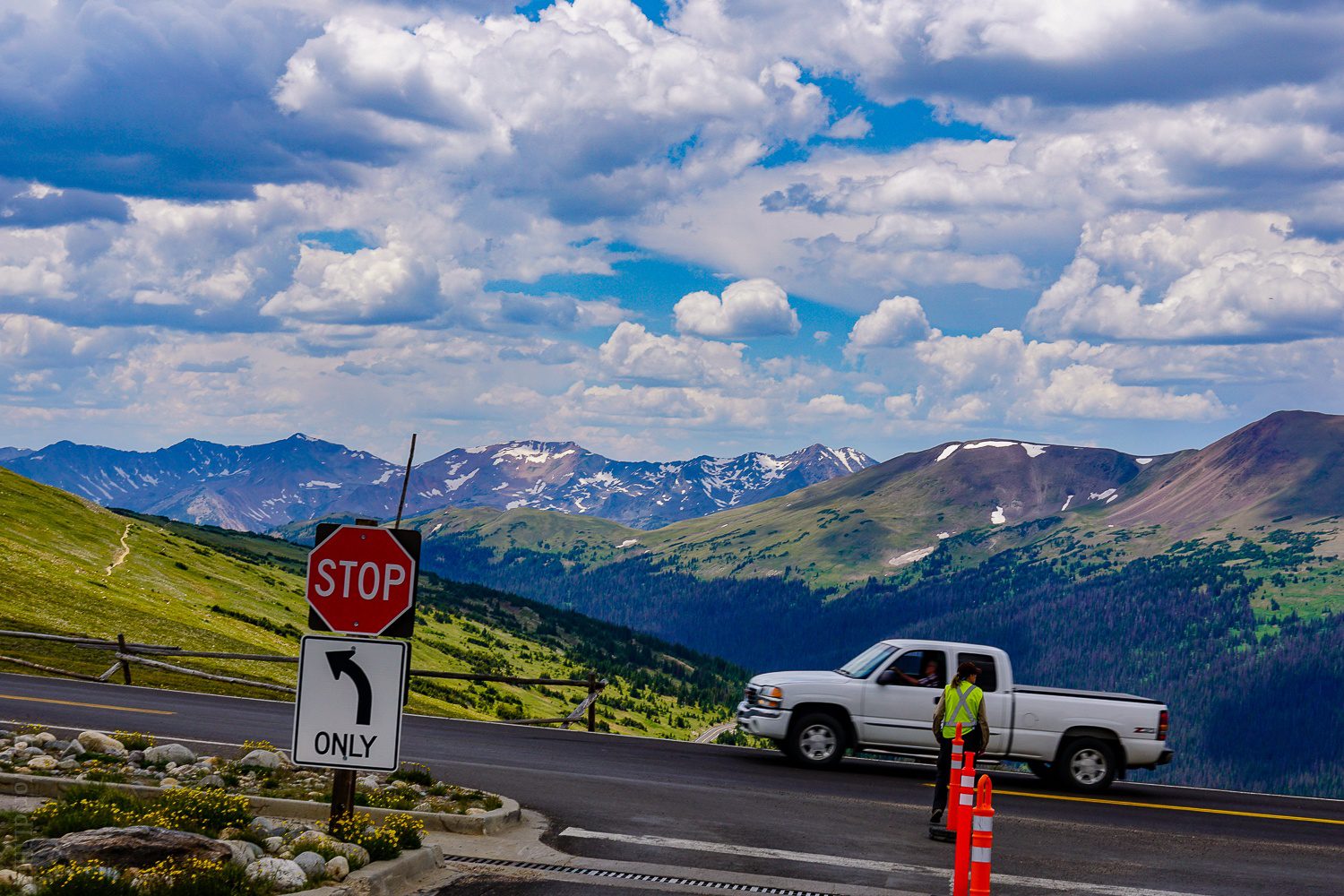
When to Keep “Travelling” Spelling
Option #2: Change between “Travelling” and “Traveling” based on what the majority audience of the piece is expecting.
This option is what I chose to do for interviews with these teachers from Canada and Ghana, because I decided that readers would understand that the “Travelling” spelling was correct in the context of the British English country the speakers were from.
I also knew that the interviewees would also be sharing the articles with their friends, who in turn were used to the double-L spelling. In other words, it wouldn’t be correct for me to “correct” their British spelling in that situation.
Avoiding Traveling vs. Travelling
Bonus Option: Really stuck for whether to use Traveling or Travelling? If your piece is short enough, alter word choice so you don’t need to use either! For example, instead of saying, “I’m a traveller,” write, “I’m a person who loves to travel.” Kind of sneaky and sometimes silly, but if you’re really stuck, it’s an option.

So, Traveling or Travelling?
In summary, it comes down to this: What does the specific audience of your written piece need and expect? Who you are and where you’re from becomes secondary to who they are and what they need.
That’s kind of deep, eh?
I hope you enjoyed this grammar lesson and found it useful. It’s the first one I’ve written (well, besides a tutorial on how to use the word “Dushi“), and I must say that I found it so fun to write that I might just start putting down more of my 15 years of English teaching knowledge into articles…
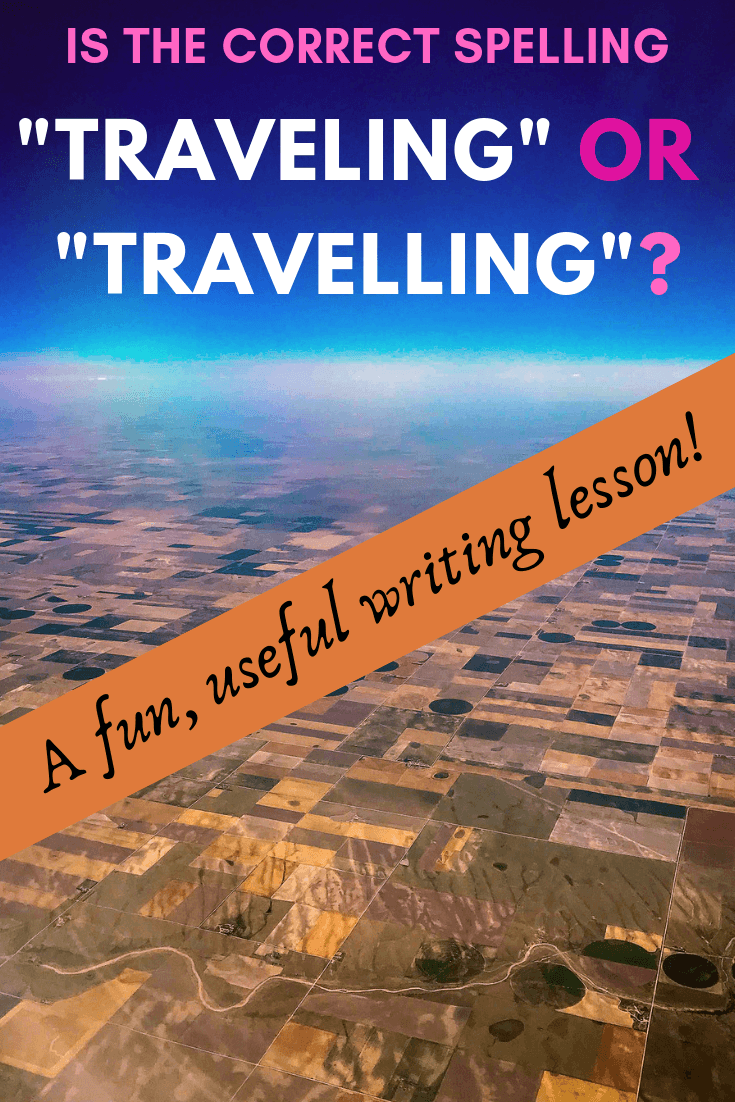
So what about you? What’s been your experience with the Traveling/Travelling divide? Did you know this rule before, and how did you learn it?
Are there other grammar, writing, or global education lessons you’d like to see on these pages? Do share!
The author, Lillie Marshall, is a 6-foot-tall National Board Certified Teacher of English from Boston who has been a public school educator since 2003. She launched TeachingTraveling.com in 2010 to share expert global education resources, and over 1.6 million readers have visited over the past decade. Lillie also runs AroundTheWorld L.com Travel and Life Blog, and DrawingsOf.com for educational art. Do stay in touch via subscribing to her monthly newsletter, and following @WorldLillie on social media!

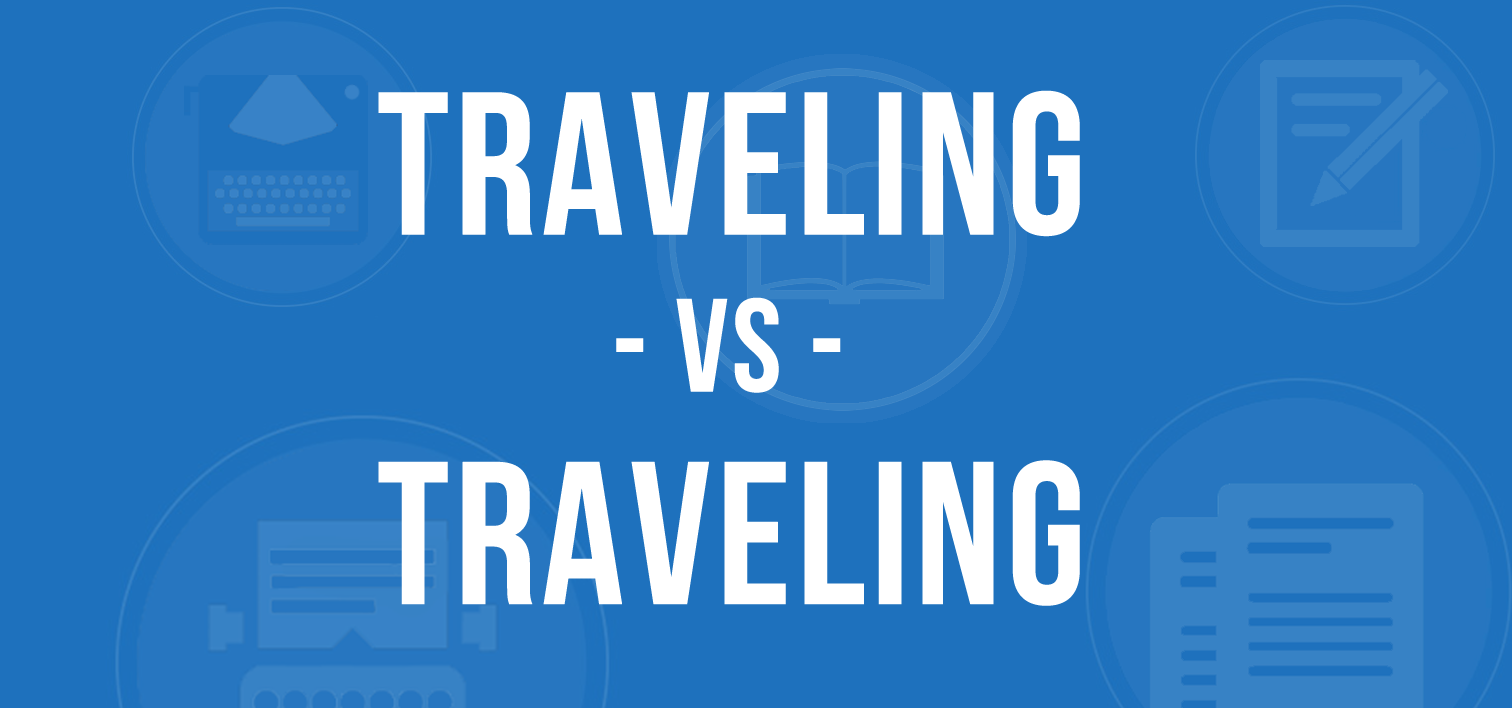
 It was already too late; he knew they wouldn’t be travelling far. –The New Yorker
It was already too late; he knew they wouldn’t be travelling far. –The New Yorker